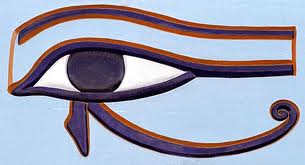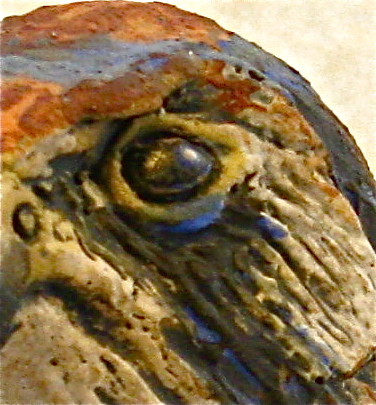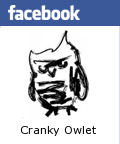Falconeye
 As long ago as the Old Kingdom (the middle of the third millenium BCE), the Egyptians used the eye of the Falcon — the eye of Horus, the falcon-headed deity — as an apotropaic, or protective symbol, wearing the still-popular faience amulets as personal ornament, or tucking them into the wrappings of mummies.
As long ago as the Old Kingdom (the middle of the third millenium BCE), the Egyptians used the eye of the Falcon — the eye of Horus, the falcon-headed deity — as an apotropaic, or protective symbol, wearing the still-popular faience amulets as personal ornament, or tucking them into the wrappings of mummies.
The Left Eye of Horus, also known as the Wedjat Eye, was known to be particularly potent, and its resurrective power was demonstrated by bringing Osirus back to life. According to the British Museum:
The name wedjat means ‘the sound one’, referring to the lunar left eye of Horus that was plucked out by his rival Seth during their conflict over the throne. The restoration of the eye is variously attributed to Thoth, Hathor or Isis. The injury to the eye and its subsequent healing were believed to be reflected in the waxing and waning of the moon.
Horus’s falcon counterpart is said to be the Lanner (Falco biarmicus), a falcon of southern Europe, Africa, and the middle east. We don’t have Lanners living wild in this hemisphere, but most falcons display the typical black “speed stripe” below the eye, like cheetahs, which is the distinctive characteristic of the Wedjat Eye symbol. To illustrate, here’s a detail of a clay portrait of a native falcon I recently completed: the left eye of a male American kestrel, the smallest falcon in North America, and terrorizer of finches, grasshoppers, and small rodents.
but most falcons display the typical black “speed stripe” below the eye, like cheetahs, which is the distinctive characteristic of the Wedjat Eye symbol. To illustrate, here’s a detail of a clay portrait of a native falcon I recently completed: the left eye of a male American kestrel, the smallest falcon in North America, and terrorizer of finches, grasshoppers, and small rodents.
Really, I don’t know if a Kestrel’s eye is so much a bringer of life, as it is a see-er of lunch, but, that’s life-giving to a kestrel, if not to the lunch.

Would love to see the whole bird, if possible. Any shows upcoming in the winter months?
sue, the partial presentation of this piece is the result of conflicting desires to share it but also to maintain a necessary restraint — I’ll post the whole piece once the person for whom it was made has seen it! So, in the meantime, we get just the Eye of Horus!
re: shows. my next event isn’t until next march, the San Diego Audubon Bird Festival.